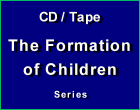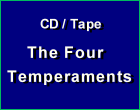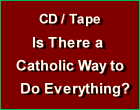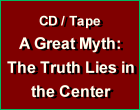Ecology
 |
 |
 |
 |
 |
 |
 |
Animals Are Not Children
For many years I have observed the growing phenomenon of people referring to cats and dogs as their children. Before I continue, I must say that I “love” dogs and animals in general. I have always had a dog and other types of animals throughout my life.
My respect for God’s creation follows what He instructed in the book of Genesis. The Catholic teaching is very clear on how we should conduct ourselves in regard to animal treatment.
Respect for the integrity of creation
Some instructions in the Catechism of the Catholic Church give us these guidelines:
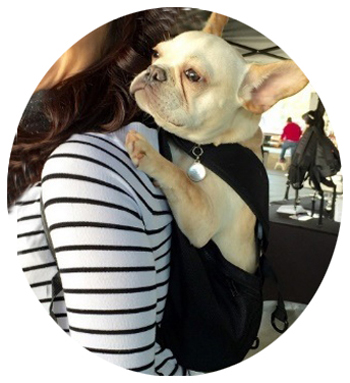 As in many things, Catholics and others have gone too far, giving animals an affection that is due only to persons. When people embark on this misinformed journey, only chaos and destruction follow.
As in many things, Catholics and others have gone too far, giving animals an affection that is due only to persons. When people embark on this misinformed journey, only chaos and destruction follow.
Allow me to offer some instances of how far modern men have travelled from correct action and thought concerning God’s creation.
There is a story I would like to share with you to illustrate just how ludicrous the pet situation has become. One day a man whom I shall call Thomas got the news that his mother-in-law and maternal aunt had passed away within days of each other. Thomas had to deal with these losses and pains, and his wife was very sad at the death of her mother. As the story continues, Thomas notified his co-workers about his losses. Most were sympathetic about the situation.
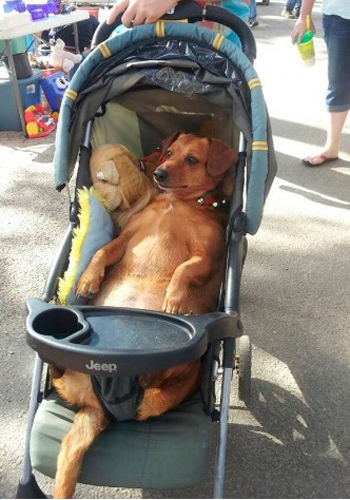 Later that day Thomas learned that a co-worker's cat had died. The same co-worker and other office workers who had showed a polite sympathy for the death of his relatives became traumatized over the death of the cat. Several made statements like these, “The cat was like her child,” “She had no children, and the cat was her child.”
Later that day Thomas learned that a co-worker's cat had died. The same co-worker and other office workers who had showed a polite sympathy for the death of his relatives became traumatized over the death of the cat. Several made statements like these, “The cat was like her child,” “She had no children, and the cat was her child.”
One person actually told him that she read an article pointing out that a person grieves more for an animal than a family member. To say the least, I was taken aback by the contradiction: more sympathy and grief for the loss of a pet than for persons.
Thinking about this, I recalled several other incidents that pulled things together in my mind.
One day not long ago I saw a young woman pushing a baby stroller along the sidewalk. As I passed her, I looked into the stroller and saw an otherwise young and apparently healthy dog. On another occasion I saw a person carrying a dog in a baby pack, similar to the first picture of this article.
A very reliable person told me he had witnessed a dog that had been run over on a particularly busy street in his neighborhood. He saw a small group of concerned individuals gathered around the dog, carrying on with great concern.
Now then, the speeding traffic on this street had been going on for years, causing danger for the families and their children in the area. There had been attempts to correct the situation by installing a STOP sign on that particular corner where the dog was run over, but to no avail. A short time after the death of the dog, he told me that the city installed a STOP sign.
Did the death of the dog cause the city to finally take the needed action? We cannot be sure but the timing was curious. The sign only appeared shortly after the dog’s death.
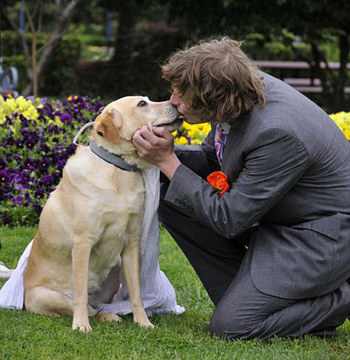 ”Man marries his dog” is the headline on this paper reporting about a man who on his Myspace page describes himself as straight, single and Catholic. Such stories are now commonplace in our world.
”Man marries his dog” is the headline on this paper reporting about a man who on his Myspace page describes himself as straight, single and Catholic. Such stories are now commonplace in our world.
In another report from Fox News, a British woman decided it would be a good idea to marry the dolphin she had fallen in love with. Apparently there is no limit to the lunacy of actions like these, which increase daily.
As one famous still-sane dog trainer has said, we humans have caused more problems than help for our canines by our over-pampering. The way we look at them conveys how we feel and they pick up on this energy. The three laws that he teaches are rooted in the proper way to care for them: Dogs are animals, species, dog-and-name, in this order. When we treat them as equals we actually cause an unbalanced situation.
Children as animals & animals as children
There is an article written by Dr. Marian T. Horvat, "Please Say Children, Not Kids" that I had read a few years back. As a parent of children I had called my children “kids’ numerous times without any thought to how this name came to be applied to children. I have since corrected myself and no longer refer to my children as kids.
The thought occurred to me that in our misguided thinking about children and animals we had flipped terms and ideas. We call children “kids” and animals “children.”
Dr. Horvat pointed out in her article that it is very important that we use good language and customs. Ultimately we must fight for a truly Catholic Civilization as this elevates man to his highest potential with the help of God's grace.
Taking care of God’s creation
God gave us clear instruction on caring for his animals. In the article “What We Owe What We Eat,” George F. Will laid out the case for proper treatment of what we eat. We have a duty to treat with respect the animals we use for food. Causing unnecessary pain and suffering is not in keeping with our care for God’s creation.
We should read how St. Francis treated all animals and how they responded to him. The story of St. Francis and the Wolf of Gubbio relates how this Saint dealt with a wolf that had been terrorizing the town of Gubbio by eating its livestock and even some of its inhabitants. Hearing about this ferocious beast, St. Francis decided to go meet it.
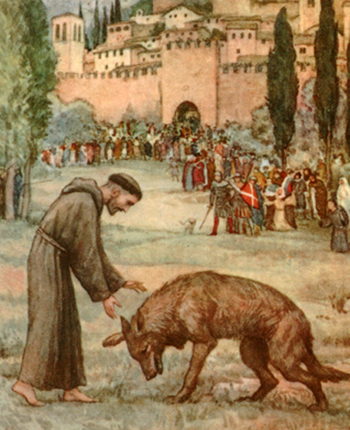 As St. Francis approached its lair, the wolf ran towards him. St. Francis made the Sign of the Cross and in the name of God commanded the wolf to stop terrorizing the town. The wolf became docile and listened to St. Francis’ rebuke. The wolf agreed not to terrorize the town and the town agreed to provide food for him. A proper balance betweeen man and beast was achieved with the help of St. Francis.
As St. Francis approached its lair, the wolf ran towards him. St. Francis made the Sign of the Cross and in the name of God commanded the wolf to stop terrorizing the town. The wolf became docile and listened to St. Francis’ rebuke. The wolf agreed not to terrorize the town and the town agreed to provide food for him. A proper balance betweeen man and beast was achieved with the help of St. Francis.
St. Thomas Aquinas in his Summa Contra Gentiles (Book II, 112) also gave us this orientation: “Lest anyone by exercising cruelty towards brutes may become cruel also towards men; or, because an injury to brutes may result in loss to the owner, or on account of some symbolic signification.”
Cardinal Manning has this to say on treatment of animals: "It is perfectly true that obligations and duties are between moral persons and, therefore, the lower animals are not susceptible of the moral obligations that we owe to one another. But we owe a seven-fold obligation to the Creator of those animals. Our obligation and moral duty is to Him who made them, and if we wish to know the limit and the broad outline of our obligation, I say at once it is His nature and His perfections and among these perfections one is, most profoundly, that of Eternal Mercy.
“And, therefore, although a poor mule or a poor horse is not, indeed, a moral person, yet the Lord and Maker of the mule is the highest Lawgiver, and His nature is a law unto Himself. And in giving a dominion over His creatures to man, He gave it subject to the condition that it should be used in conformity to His perfections, which are His own law and, therefore, our law.” (The Zoophilist, London, 1 April, 1887)
As a last word, I repeat what the Catechism clearly states in paragraph 2418: We can love animals, but we cannot direct to them affection due only to persons.

My respect for God’s creation follows what He instructed in the book of Genesis. The Catholic teaching is very clear on how we should conduct ourselves in regard to animal treatment.
Respect for the integrity of creation
Some instructions in the Catechism of the Catholic Church give us these guidelines:
- Animals are God's creatures. He surrounds them with his providential care. By their mere existence they bless Him and give Him glory. Thus men owe them kindness. We should recall the gentleness with which saints like St. Francis of Assisi or St. Philip Neri treated animals. (2416)
- God entrusted animals to the stewardship of those whom He created in His own image. Hence it is legitimate to use animals for food and clothing. They may be domesticated to help man in his work and leisure. Medical and scientific experimentation on animals is a morally acceptable practice if it remains within reasonable limits and contributes to caring for or saving human lives. (2417)
- It is contrary to human dignity to cause animals to suffer or die needlessly. It is likewise unworthy to spend money on them that should as a priority go to the relief of human misery. One can love animals; one should not direct to them the affection due only to persons. (2418)

Allow me to offer some instances of how far modern men have travelled from correct action and thought concerning God’s creation.
There is a story I would like to share with you to illustrate just how ludicrous the pet situation has become. One day a man whom I shall call Thomas got the news that his mother-in-law and maternal aunt had passed away within days of each other. Thomas had to deal with these losses and pains, and his wife was very sad at the death of her mother. As the story continues, Thomas notified his co-workers about his losses. Most were sympathetic about the situation.

One person actually told him that she read an article pointing out that a person grieves more for an animal than a family member. To say the least, I was taken aback by the contradiction: more sympathy and grief for the loss of a pet than for persons.
Thinking about this, I recalled several other incidents that pulled things together in my mind.
One day not long ago I saw a young woman pushing a baby stroller along the sidewalk. As I passed her, I looked into the stroller and saw an otherwise young and apparently healthy dog. On another occasion I saw a person carrying a dog in a baby pack, similar to the first picture of this article.
A very reliable person told me he had witnessed a dog that had been run over on a particularly busy street in his neighborhood. He saw a small group of concerned individuals gathered around the dog, carrying on with great concern.
Now then, the speeding traffic on this street had been going on for years, causing danger for the families and their children in the area. There had been attempts to correct the situation by installing a STOP sign on that particular corner where the dog was run over, but to no avail. A short time after the death of the dog, he told me that the city installed a STOP sign.
Did the death of the dog cause the city to finally take the needed action? We cannot be sure but the timing was curious. The sign only appeared shortly after the dog’s death.

A man kisses his new 'bride' at an outdoor 'wedding' ceremony in Australia
In another report from Fox News, a British woman decided it would be a good idea to marry the dolphin she had fallen in love with. Apparently there is no limit to the lunacy of actions like these, which increase daily.
As one famous still-sane dog trainer has said, we humans have caused more problems than help for our canines by our over-pampering. The way we look at them conveys how we feel and they pick up on this energy. The three laws that he teaches are rooted in the proper way to care for them: Dogs are animals, species, dog-and-name, in this order. When we treat them as equals we actually cause an unbalanced situation.
Children as animals & animals as children
There is an article written by Dr. Marian T. Horvat, "Please Say Children, Not Kids" that I had read a few years back. As a parent of children I had called my children “kids’ numerous times without any thought to how this name came to be applied to children. I have since corrected myself and no longer refer to my children as kids.
The thought occurred to me that in our misguided thinking about children and animals we had flipped terms and ideas. We call children “kids” and animals “children.”
Dr. Horvat pointed out in her article that it is very important that we use good language and customs. Ultimately we must fight for a truly Catholic Civilization as this elevates man to his highest potential with the help of God's grace.
Taking care of God’s creation
God gave us clear instruction on caring for his animals. In the article “What We Owe What We Eat,” George F. Will laid out the case for proper treatment of what we eat. We have a duty to treat with respect the animals we use for food. Causing unnecessary pain and suffering is not in keeping with our care for God’s creation.
We should read how St. Francis treated all animals and how they responded to him. The story of St. Francis and the Wolf of Gubbio relates how this Saint dealt with a wolf that had been terrorizing the town of Gubbio by eating its livestock and even some of its inhabitants. Hearing about this ferocious beast, St. Francis decided to go meet it.

St. Francis rebukes the wolf of Gubbio
St. Thomas Aquinas in his Summa Contra Gentiles (Book II, 112) also gave us this orientation: “Lest anyone by exercising cruelty towards brutes may become cruel also towards men; or, because an injury to brutes may result in loss to the owner, or on account of some symbolic signification.”
Cardinal Manning has this to say on treatment of animals: "It is perfectly true that obligations and duties are between moral persons and, therefore, the lower animals are not susceptible of the moral obligations that we owe to one another. But we owe a seven-fold obligation to the Creator of those animals. Our obligation and moral duty is to Him who made them, and if we wish to know the limit and the broad outline of our obligation, I say at once it is His nature and His perfections and among these perfections one is, most profoundly, that of Eternal Mercy.
“And, therefore, although a poor mule or a poor horse is not, indeed, a moral person, yet the Lord and Maker of the mule is the highest Lawgiver, and His nature is a law unto Himself. And in giving a dominion over His creatures to man, He gave it subject to the condition that it should be used in conformity to His perfections, which are His own law and, therefore, our law.” (The Zoophilist, London, 1 April, 1887)
As a last word, I repeat what the Catechism clearly states in paragraph 2418: We can love animals, but we cannot direct to them affection due only to persons.

Posted June 13, 2018
______________________
______________________






